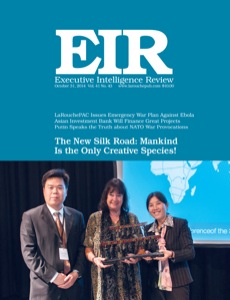Schiller Institute Conference: The New Silk Road: Mankind Is the Only Creative Species!
We begin our coverage of the 30th anniversary conference of the Schiller Institute with speeches from the first panel, titled, “The New Silk Road Is Transforming the Planet,” featuring a keynote address by Helga Zepp-LaRouche, in which she laid out in stark terms, the triple threat that faces mankind today: the spreading Ebola epidemic; the expanding incursions of the barbaric ISIS terrorism in Southwest Asia, and beyond; and the disintegration of the global financial system.
Conference Program: The New Silk Road and China’s Lunar Program
A New Era of Mankind
by Helga Zepp-LaRouche
Zepp-LaRouche’s keynote speech. “We are in a crisis moment of unprecedented dimensions,” she said. “Humanity right now is on the edge of a genocide which could become worse than anything that ever happened in history.” But, the crises are man-made, and can therefore be remedied—if we can find the political will to do so.
Ideas for Cooperation Along the Silk Road
by Shi Ze
Mr. Shi is the Director for International Energy Strategy Studies, and Senior Fellow, China Institute of International Studies (CIIS).
Iran’s Role in the Silk Road in the Third Millennium
by Dr. Fatemeh Hashemi Rafsanjani
Dr. Rafsanjani is the head of the Women’s Solidarity Association in Iran and founder of the Charity Foundation for special disease activities.
The BRICS and the New International Order
by Jayshree Sengupta
Ms. Sengupta is a Senior Fellow, Observer Research Foundation, New Delhi, India.
A New World Order and Stability in Ukraine
by Natalia Vitrenko
Dr. Vitrenko is a Doctor of Economics and Chairman of the Progressive Socialist Party of Ukraine.
A Vision of the Future of Eurasia
by Ali Rastbeen
Mr. Rastbeen is the founder and President of the Paris Academy of Geopolitics.
National
LaRouche PAC Issues Emergency War Plan Against Ebola
by Dr. Debra Freeman
Dr. Debra Freeman, national spokeswoman for Lyndon LaRouche, issued this statement on Oct. 24, which is being circulated in a mass leaflet form by the LaRouche Political Action Committee. It reports on a three-phase program for control of epidemic disease, outlined by Dr. Michael Osterholm, one of the world’s leading experts on public health and biosecurity.
Economics
A Challenge to Pessimism: Asian Investment Bank Will Finance Great Projects
by Helga Zepp-LaRouche
“There is an unmistakable indicator that provides information about whether a government is making good policy or not,” writes Helga Zepp-LaRouche. “If the majority of the population is happy and optimistic about the future, the government would appear to be fulfilling its mission to serve the common good. Should the vast majority of people, however, be pessimistic about the possibility of change and a better future, then this government is obviously pursuing a bad policy.” Contrast, then, the governments of China and India vs. those of Europe.
China Opens the Floodgates: Huge Project To Address Water Scarcity
by Mary Burdman
After investing more than a decade in constructing dams, canals, tunnels, and the world’s most modern aqueduct, and just as long in intensive measures to improve and protect water quality in the upper Yangtze River system, China has completed the Central Route of its huge South-North Water Transfer Project.
International
Putin Speaks the Truth about NATO’s War Provocations
by Jeffrey Steinberg
Russian President Vladimir Putin used the occasion of the annual Valdai Club dialogue in Sochi, Russia, Oct. 24 to deliver a sweeping assessment of the present danger of global war, and the efforts that Russia is taking to avert that outcome.
To Defeat ISIS, You Have To Face Reality
by Jeffrey Steinberg
EIR Counterintelligence Editor Jeffrey Steinberg’s response to a question, during the Oct. 24 LaRouche PAC webcast.
Editorial
Exposing the Really Big Lie



